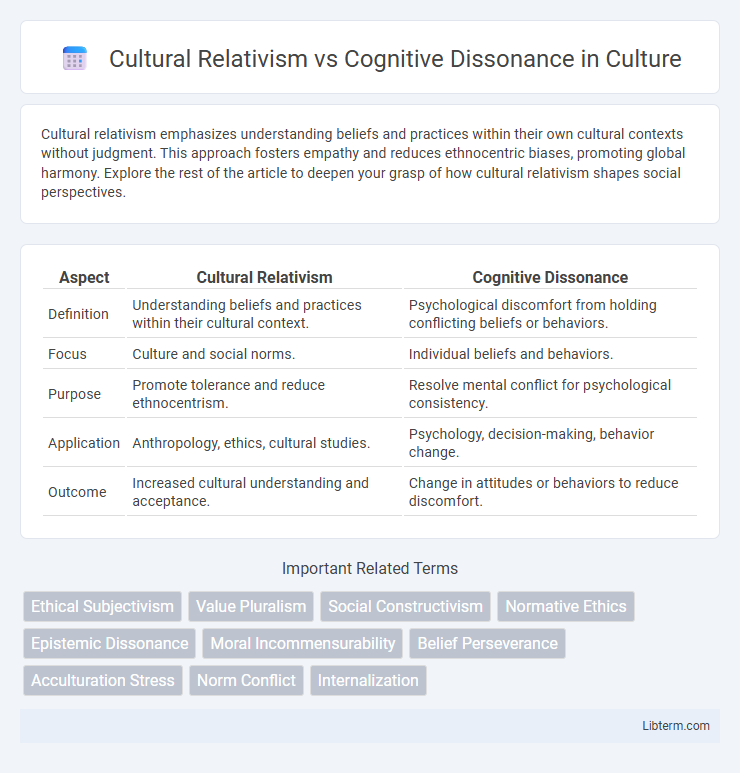Cultural relativism emphasizes understanding beliefs and practices within their own cultural contexts without judgment. This approach fosters empathy and reduces ethnocentric biases, promoting global harmony. Explore the rest of the article to deepen your grasp of how cultural relativism shapes social perspectives.
Table of Comparison
| Aspect | Cultural Relativism | Cognitive Dissonance |
|---|---|---|
| Definition | Understanding beliefs and practices within their cultural context. | Psychological discomfort from holding conflicting beliefs or behaviors. |
| Focus | Culture and social norms. | Individual beliefs and behaviors. |
| Purpose | Promote tolerance and reduce ethnocentrism. | Resolve mental conflict for psychological consistency. |
| Application | Anthropology, ethics, cultural studies. | Psychology, decision-making, behavior change. |
| Outcome | Increased cultural understanding and acceptance. | Change in attitudes or behaviors to reduce discomfort. |
Understanding Cultural Relativism
Cultural relativism is the principle that an individual's beliefs and activities should be understood by others in terms of that individual's own culture, emphasizing the importance of context in evaluating cultural practices. It challenges ethnocentrism by promoting the idea that no one culture holds universal superiority or absolute moral standards. Understanding cultural relativism helps mitigate cognitive dissonance by encouraging open-mindedness and reducing the psychological discomfort that arises from conflicting cultural values.
Defining Cognitive Dissonance
Cognitive dissonance is a psychological theory describing the mental discomfort experienced when an individual holds conflicting beliefs, values, or attitudes simultaneously. This internal tension drives individuals to reduce inconsistency through changing beliefs, acquiring new information, or minimizing the importance of existing dissonant elements. Unlike cultural relativism, which promotes understanding cultural differences without judgment, cognitive dissonance centers on the individual's struggle for internal psychological coherence.
Origins and Theoretical Foundations
Cultural relativism originates from anthropological studies by Franz Boas, emphasizing that cultural norms and values must be understood within their own contexts rather than judged by external standards. Cognitive dissonance theory, developed by Leon Festinger in 1957, explains the psychological discomfort experienced when individuals hold conflicting beliefs or behaviors, driving efforts to achieve internal consistency. Both frameworks address how individuals and societies interpret and reconcile differing perspectives, with cultural relativism rooted in social anthropology and cognitive dissonance grounded in social psychology.
Key Differences Between the Concepts
Cultural relativism emphasizes understanding and evaluating beliefs and practices within the context of a specific culture, avoiding ethnocentric judgments. Cognitive dissonance refers to the psychological discomfort experienced when an individual holds conflicting beliefs or attitudes, prompting efforts to reduce inconsistency. While cultural relativism deals with external cultural evaluation, cognitive dissonance centers on internal mental processes and emotional responses.
How Culture Shapes Belief Systems
Cultural relativism emphasizes that belief systems are deeply shaped by cultural context, where values, norms, and moral frameworks vary across societies, influencing individual cognition. Cognitive dissonance occurs when new information conflicts with entrenched cultural beliefs, prompting psychological tension and adjustments to maintain internal consistency. Understanding the interplay between cultural relativism and cognitive dissonance reveals how cultural environments mold perception, acceptance, and adaptation of beliefs within social groups.
The Role of Dissonance in Challenging Cultural Norms
Cognitive dissonance plays a crucial role in challenging cultural norms by exposing conflicts between personal beliefs and societal expectations, prompting individuals to question and potentially alter ingrained cultural attitudes. When confronted with practices or values that clash with their internal principles, people experience psychological discomfort, motivating them to reconcile these disparities through reflection, adaptation, or rejection of existing norms. This dynamic tension facilitates cultural relativism by encouraging a deeper understanding and reevaluation of diverse cultural frameworks rather than uncritical acceptance.
Case Studies: Relativism and Dissonance in Practice
Case studies illustrate how cultural relativism enables researchers to understand practices within their societal contexts, avoiding ethnocentric judgments. In contrast, cognitive dissonance emerges when individuals confront conflicting beliefs or behaviors, prompting psychological tension that often leads to attitude or behavior adjustments. Examining real-world scenarios where cultural norms clash with personal values reveals the dynamic interplay between acceptance of cultural diversity and the drive to reduce internal inconsistencies.
Implications for Ethics and Morality
Cultural relativism emphasizes that ethical norms and moral values are context-dependent, varying widely across societies, which challenges the imposition of universal moral standards. Cognitive dissonance occurs when individuals encounter conflicting beliefs or behaviors, prompting psychological discomfort that can lead to moral self-justification or ethical compromise. Understanding these dynamics is crucial for navigating moral pluralism, fostering tolerance, and addressing ethical dilemmas in multicultural settings.
Psychological Impact of Navigating Contradictory Values
Navigating contradictory values through cultural relativism often leads to psychological stress due to conflicting ethical frameworks, resulting in cognitive dissonance characterized by discomfort and mental tension. This psychological conflict can provoke adaptive mechanisms like rationalization or selective perception to reconcile divergent cultural norms with personal beliefs. Understanding the interplay between cultural relativism and cognitive dissonance is crucial in addressing identity conflicts and promoting psychological resilience in multicultural environments.
Integrating Relativism and Dissonance in Modern Discourse
Integrating cultural relativism and cognitive dissonance in modern discourse enhances understanding of how individuals process conflicting cultural values and beliefs. Recognizing cognitive dissonance as a psychological response to cultural relativism encourages adaptive dialogue that respects diverse worldviews while addressing internal conflicts. This approach fosters nuanced conversations in multicultural contexts, promoting empathy and reducing ethnocentric bias.
Cultural Relativism Infographic

 libterm.com
libterm.com